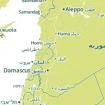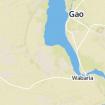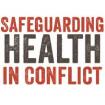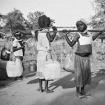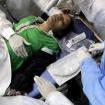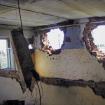News, blog posts, and event announcements. Other websites are welcome to cross-post this material with attribution and a link to the original.
What's New
01/24/2013
LONDON (AlertNet) - More than half Syria's 88 hospitals have been damaged in the country's bitter civil war, and nearly one third are out of service, making it difficult for people to get medical care, Syrian and U.N. health officials have reported. December data from Syria's health ministry, released by the World Health Organization (WHO) on Wednesday, shows that 48 hospitals have been damaged, of which 27 are no longer operating. Syria's 1,919 public health centres have been less severely affected - around 10 percent are damaged and 6 percent closed.
01/17/2013
Twelve of the women who were forced out of their hospital beds when radical Islamists seized the city of Gao in northern Mali have finally been found and treated, thanks to the reinstatement of the Fistula Care Project in Mali. After a long search, the project and its local partner GREFFA located many of the missing women—some of whom had been without care for almost nine months. Project staff then transported them and ten other obstetric fistula patients to Mopti, a city southwest of Gao, where a surgical team provided the treatment, care, and referrals the women so urgently needed.
01/16/2013
Côte d'Ivoire: three Ivorian singers – Kajeem, Onakamy and Mawa Traoré – supported by the ICRC, have launched a video clip for the song “C'est une question de vie et de mort.” The video is part of the Health Care in Danger campaign, and is a call for action to all those who can facilitate – or prevent – the vital work of first aiders and medical personnel in situations of violence and other emergencies.
01/08/2013
Dear President Obama, In the first years of the Peace Corps, its director, Sargent Shriver, discovered that the Central Intelligence Agency (CIA) was infiltrating his efforts and programs for covert purposes. Mr. Shriver forcefully expressed the unacceptability of this to the President. His action, and the repeated vigilance and actions of future directors, has preserved the Peace Corps as a vehicle of service for our country’s most idealistic citizens. It also protects our Peace Corps volunteers from unwarranted suspicion, and provides opportunities for the Peace Corps to operate in areas of great need that otherwise would be closed off to them.
12/21/2012
The cold-blooded and premeditated murder of 8 public health workers in Pakistan this week once again brings attention to an issue that is not being adequately addressed: the protection of health care practitioners and allied workers, of health systems’ infrastructure and services, and of health service beneficiaries. Attacks on health care workers, health facilities/services and beneficiaries violate international humanitarian and human rights law. The consequences of such attacks extend beyond the immediate victims: the beneficiaries of the health services, primarily children and their mothers, suffer the effects of the preventable illnesses that occur as a result of the interruption in much-needed health services.
12/19/2012
The Safeguarding Health in Conflict coalition joins the World Health Organization in condemning recent attacks that have killed or wounded several polio eradication campaign workers in Pakistan. The murder of these health workers is a personal tragedy, and a major setback in the effort to eliminate polio myelitis from the region. Vaccination campaigns and public health services are critical to the health of communities and must be protected in times of conflict. The Safeguarding Health in Conflict coalition supports the World Health Organization’s efforts to document attacks on these critical elements of the health system under the resolution adopted in May 2012.
12/18/2012
“The situation [in our village] was very bad,” said Saudia Idris, a refugee from Blue Nile State. “There was no relief. The planes were constantly bombing us and the militia were attacking us. It was no way to live,” she told Human Rights Watch. “Disease began to spread, but we couldn’t get any medication because the militia were always attacking.” The Sudanese government’s indiscriminate aerial bombardment and shelling in Blue Nile and Southern Kordofan states has killed and injured scores of civilians since the conflict began more than a year ago, Human Rights Watch said in a report, Under Siege.
12/06/2012
Mali is currently experiencing the most severe crisis of its existence. When heavily armed Tuareg rebels and Islamist rebel groups poured in from Libya on January 17, 2012, they quickly defeated the underequipped, disorganized Malian army. Now they have seized the country’s vast northern regions and are working to force sharia—or Islamic law—on the people there. The most visible rebel chief is not Malian—he is from Pakistan—and he often appears on TV to say that sharia is good for Mali. That if Mali accepts Islamic law, the rebels will help the country to get funds from other Islamic countries. We never thought something like this could happen in Mali. It still feels like a dream, like it’s not reality.
11/23/2012
In Bahrain, health workers have been drawn into the conflict that began in February 2011 when protesters called for reform and the government responded with violence. By treating wounded civilians, frontline health workers witnessed the effects of the government crackdown—and quickly became targets themselves. One health worker recently told news outlet RT of her experience. “As a punishment for not obeying the authorities to abandon these patients, all the doctors who were involved in treating these patients, they were arrested. Myself personally, I was abducted from my house at 3 am in the morning, and I was badly mistreated… I was tortured. Later on, after being jailed for almost two months, I was prosecuted, tried in a military court and was sentenced to 15 years imprisonment,” said Dr. Nada Dhaif.
11/05/2012
The World Medical Association revised its Regulations in Times of Armed Conflict and Other Situations of Violence, endorsing collection of data and including a code of conduct for physicians in conflicts. In May 2012 at the World Health Assembly, member states of the World Health Organization passed a resolution requiring the WHO to lead international data collection of attacks on health workers, facilities, transports, and patients.


